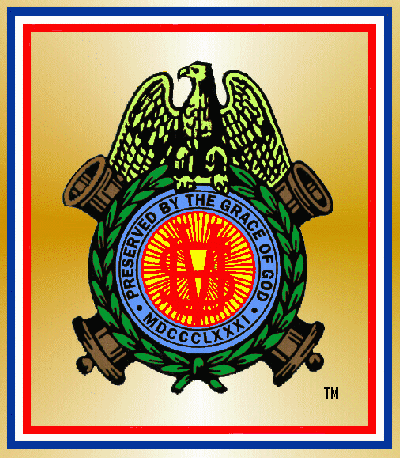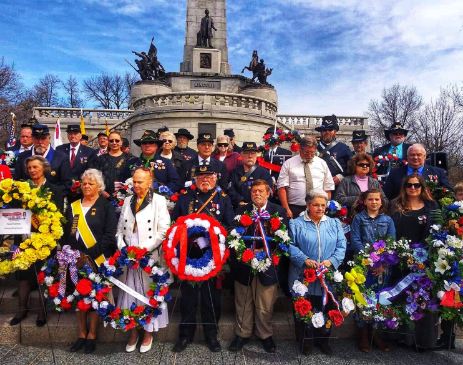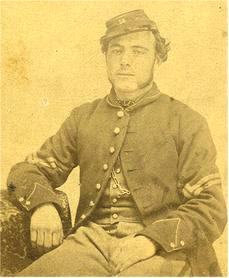John L D Hopkins
Sons of Union Veterans of the Civil War


John Lee Dyer Hopkins Sergeant John L.D. Hopkins served in Company A, 58th Regiment Massachusetts Volunteer Infantry. He was the son of Isaac and Ruth Hopkins, and was born in Truro, Massachusetts in March 1843. He enlisted as a Private on December 22, 1863, and trained at Readville, Massachusetts. He was mustered into Federal service as a Corporal on February 12, 1864. He went to the front with his regiment on April 28, 1864, which was assigned to the 1st Brigade, 2nd Division, 9th Corps, Army of the Potomac. After a forced march across Northern Virginia in brutal heat, the 58th Massachusetts joined-up with the 9th Corps and participated in the Battle of the Wilderness on May 6, 1864. Those members of the 58th Massachusetts who fell out of this forced march were either killed by Confederate guerillas (contrary to the laws of war), or they were captured by Confederate cavalry--and sent to the Confederate Prisoner of War Camp at Andersonville; where most of them died of starvation and disease.
On May 12, 1864, then-Corporal Hopkins participated in the charge of the 58th Massachusetts at Spotsylvania, where he was slightly wounded-in-action. On June 3, 1864, Corporal Hopkins participated in another great charge of the 58th Massachusetts at the Battle of Cold Harbor; this charge was highly praised in LTC William Fox's Regimental Losses in the American Civil War. On June 17, 1864, Corporal Hopkins participated in yet another great charge of the 58th Massachusetts, this time in the initial assault on Petersburg--where Potter's 2nd Division, 9th Corps actually broke the Confederate line, capturing one stand of colors, a three-gun battery, and 200 prisoners. The initial success amounted to nothing because they were unsupported by another corps. On July 30, 1864, Corporal Hopkins participated in yet another great charge of the 58th because they were unsupported by another corps; this time at the Battle of the Crater--where, once again, the 9th Corps broke the enemy line, but was not properly supported. Corporal Hopkins was again slightly wounded-in-action, and temporarily missing-in-action. When he returned to his unit, he was promoted to Sergeant.
On September 30, 1864, Sergeant Hopkins participated in charge upon the Confederate lines with the 58th Massachusetts at Poplar Springs Church (aka Poplar Grove Church). Several regiments of the 2nd Division, 9th Corps were surrounded by a counter-attack of FIVE CONFEDERATE BRIGADES, SUPPORTED BY A FIELD ARTILLERY BATTERY. The regiments of the 9th Corps fought as best they could until obliged to surrender or be slaughtered. Sergeant Hopkins was shipped to the Confederate Prisoner of War Camp at Salisbury, North Carolina along with nearly 100 other members of the 58th Massachusetts. Suffering from the effects of starvation and disease, he was admitted to the prison hospital in late January 1865. On February 12, 1865--President Abraham Lincoln's last birthday--Sergeant Hopkins died of starvation and disease and was buried in a mass grave, along with 11,700 other Federal Prisoners of War at Salisbury. By all accounts, the conditions at Salisbury were absolutely appalling.
After the Civil War, a cenotaph was erected to the memory of JOHN L.D. HOPKINS in the Truro, Massachusetts, Congregational Churchyard Cemetery--which is 'flagged' every Memorial Day by his devoted descendant. The cenotaph reads: Sgt. John L.D. Hopkins, Co. A, 58th Rgt., Mass. Vols., d. in Salisbury Prison, N.C., 12 Feb. 1865 aged 21 yrs, 11 mos. With patriotic ardor, he obeyed the call of his country in her hour of peril. Bravery and fidelity characterized him as a soldier. With patience he endured martyrdom in her cause. With resignation and hope he committed himself to God, who hears the sighing of the prisoner [of war].
In a mere 11 months of near constant combat, the 58th Massachusetts lost 10 officers and 129 enlisted men who were killed or mortally-wounded-in-action, for a total of 139 combat fatalities. The 58th Massachusetts lost another 89 men who died in Confederate Prisoner of War Camps, namely Andersonville and Salisbury.
Sergeant John L.D. Hopkins was a direct descendant of Stephen Hopkins of the Mayflower; and, Stephen Hopkins was an 'FFV' for having first settled at Jamestown, Virginia in 1610--after having been shipwrecked on Bermuda (while en route to Jamestown) in 1609-1610; an incident recounted in William Shakespeare's The Tempest. Photograph and information submitted by Douglass Knight. Douglass Knight has a Membership Medal of the 58th Massachusetts Veterans Association--of which John L.D. Hopkins would have been a member had he not died in a Confederate Prisoner of War Camp in 1865.
Sergeant John L.D. Hopkins







